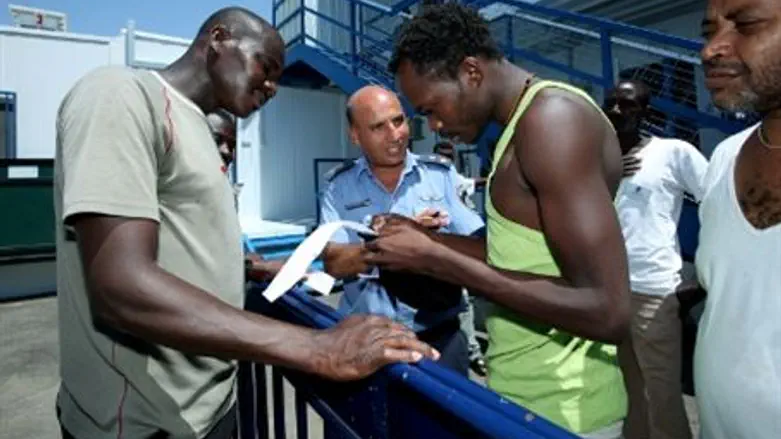
The head of the Ugandan government's refugees department, David Apollo Kazungu, has denied the existence of a deal between his country and Israel to absorb tens of thousands of illegal African immigrants currently living in the Jewish state.
Citing unnamed sources, the paper said Israel would finance the immigrants' flights to Uganda and their resettlement there and would apparently give each person $1,500 in pocket money.
It said that a court gag order barring identification of the destination country had been lifted at its request, but that the government still refused to give any details of the deal.
It quoted Israeli interior minister Gideon Saar as telling a parliamentary committee this week that a senior Israeli official had obtained Kampala's assent. It said he had told the internal affairs committee illegal immigrants would be transferred to a third country in an operation to begin at the end of September, after forthcoming Jewish holidays.
But in an email to the Haaretz newspaper, Kazunga flatly denied that such an agreement existed.
Crackdown on illegal immigration
Israeli immigration authorities say there are about 55,000 illegal African immigrants in the country. Many came by foot through Egypt and slipped through the formerly porous border into Israel, which is now being sealed by a sophisticated system of walls and electronic fences. They often face violence, kidnap and extortion at the hands of Bedouin people-smugglers in the Sinai Peninsula, and also complain of routine discrimination in Egyptian refugee camps.
In 2012, Israel launched a crackdown, rounding up and deporting 3,920 illegals. Another 2,000 are being held in a detention center. They have applied for refugee status, but their requests have yet to be processed.
The government said that while 2,295 people crossed the border illegally in January 2012, only 36 got across in the first part of December.
The topic of illegal immigration is a sensitive one in Israel. Some Israelis have urged the government to be more sympathetic in allowing them to enter the country in search of a better life, citing the State of Israel's legacy as a place of refuge for Jewish refugees.
But others point out that the massive influx of immigrants - most of whom are economic migrants, as opposed to refugees fleeing war or persecution - is unsustainable and potentially destabilizing for as small a country as Israel.
Moreover, residents of Israel's poorest neighborhoods complain that illegal immigrants are responsible for a massive spike in crime, including robbery, sexual assault and rape.
In southern Tel Aviv, where the majority of illegals have settled looking for work, the situation is particularly bad.
Last month a 35 year-old man was dragged out of his car and beaten senseless in a random attack by a gang of African youths.
Eyal Gavriel was brutally attacked in front of his wife and three young children when his car stopped at a red traffic light after being pelted with stones by the same gang.
Also in July, an illegal immigrant from Eritrea was arrested for raping a disabled Israeli woman during a robbery, one of a number of violent rapes and attempted rapes by illegals in that month alone.
Tel Aviv Mayor Run Huldai lamented after one of such incident that “The burden of the infiltrators has fallen on the residents of south Tel Aviv. The are the ones who suffer and their distress is understandable. They are forced to carry the absorption of large numbers of migrants alone. We must return the feeling of security to the residents of south Tel Aviv.”
Activists and many of the predominantly working-class residents of southern Tel Aviv have long accused liberal politicians and campaigners of double-standards on the subject of illegal African immigrants, contending that the largely sympathetic agenda towards what they terms as "infiltrators" by the political left is being executed at their expense. Community members have noted that the more affluent northern neighborhoods are conspicuously empty of African immigrants, despite their more "liberal" constituency.
Rising tensions over the growing number of illegal immigrants exploded into violence in May when a protest in south Tel Aviv turned ugly, with demonstrators smashing African shops and property, and reportedly chanting racist slogans.
Israeli politicians have visited the neighborhood in recent months, to see the situation firsthand. On a recent visit, Attorney General Yehuda Weinstein expressed his shock at what he saw and heard from local residents.
In April, Israeli MK Elazar Stern of the left-wing Hatnua party was attacked by an illegal immigrant during a tour of the area.
In June, the Israeli daily Yediot Aharonot reported the government was negotiating to deport up to 2,000 illegal Eritrean immigrants to an unnamed African country in return for supplying it with military, technological and agricultural aid.
While the country was not named, Yediot said the understandings were drafted by Prime Minister Benjamin Netanyahu's special envoy, Haggai Hadas, after visits to Uganda, Ghana, Ethiopia, Kenya, Malawi and Nigeria.